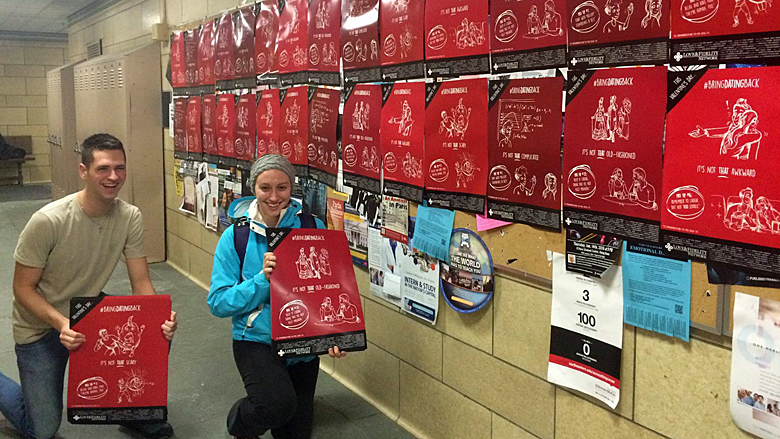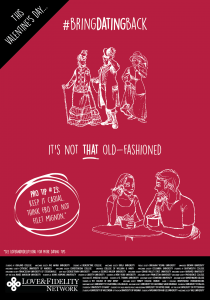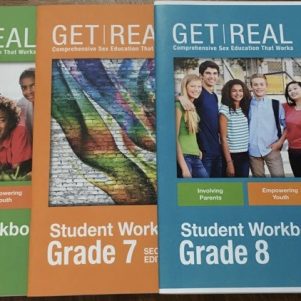Defying ‘hookup culture,’ some students work to restore romance
By Kara Bettis | February 12, 2016, 19:11 EST
 University of Pittsburgh students put up #BringDatingBack posters on campus this week (Courtesy Love and Fidelity Network)
University of Pittsburgh students put up #BringDatingBack posters on campus this week (Courtesy Love and Fidelity Network) BOSTON – This Valentine’s Day, some New England college students are working to save an endangered form of romantic relationship on their campuses – casual dating.
With many students looking for intimacy through casual sexual encounters, some have been burned by the “hookup culture” that has evolved on campus and are looking for something more than just sex in relationships. Some harbor religious objections to such banal interactions. Those who prefer something different are finding each other and speaking up about restoring romance and a return of more traditional dating.
A recent survey of 1 million users by online and mobile dating app OkCupid showed that views on dating and sex have changed significantly even over the past 10 years. For example, fewer respondents would expect sex on the first date, but the belief that you can’t have “too many sex partners” was more commonplace.
Rachel Wagley, a 2011 Harvard University graduate, helped expand the school’s Anscombe Society, a student group that advocates for a return to traditional dating, practicing chastity and premarital abstinence, sexual integrity and conservative feminist values, according to the organization’s website.
“The hookup culture is not as rampant as everyone thinks,” Wagley said in an interview Friday.
“College is either a really good time to develop good relationship practices or it’s a good time to establish really bad habits of how you treat people. What you do now matters,” she said.
Wagley, 26, sits on the alumni board of the Love and Fidelity Network, which works to promote family values and sexual ethics on 38 campuses around the U.S. February is the network’s biggest month, one that it began with a social media drive to “bring dating back.”
The #BringDatingBack campaign started last year on dozens of campuses across the country, aiming to help students get past the awkwardness and even inability to ask someone out on a first date. In New England, students from Brown University, St. Anselm College, Providence College, Harvard and Yale University are participating this year.
During the week leading up to Valentine’s Day, the Harvard group hosted a movie night featuring the 1943 romantic classic “Casablanca,” while Brown’s group screened 1953’s “Roman Holiday,” starring Audrey Hepburn. At Providence, the organization hosted a discussion on the topic, “What is Love?”
Caitlin La Ruffa, executive director of the Love and Fidelity Network, said that the idea for the campaign came from a 2014 lecture by Kerry Cronin at Boston College. The Catholic school’s famous “date doctor,” Cronin has taught seminars on dating and frequently lectures on today’s hookup culture.
Cronin told the Boston Globe in 2014 that her handling of the subject was inspired by a student’s request to be shown how to ask someone out – and what specific words to use.
Dating is a “lost social script,” she said.
Apparently, many students agree. Although the nine-year-old network usually picks a different theme each February, the #BringDatingBack campaign was so popular in 2015, organizers decided to return to it this year.
“It was really positive and encouraging – with people finally asking someone out on a date, and conversations that were sparked,” La Ruffa said.
Last year’s posters offered specific dating tips like “how to pick a great first-date spot,” including suggestions like “keep it casual,” “think froyo (frozen yogurt), not filet mignon,” and “go somewhere you can talk.”
“Initially, our starting Valentine’s Day campaign was meant to take the conversation back, to bring the conversation around Valentine’s Day in a more positive direction,” she said. “The campaign was always meant to project some positive message. We hope it will spark a conversation about what love is.”
But those students might be in the minority.
“We didn’t think it would be controversial,” said Bryan Poellot, a 21-year-old Harvard junior and current co-leader of the school’s Anscombe Society. “But apparently it is.”
A lot of the dozens of posters suggesting that dating isn’t “that old-fashioned” or “that scary” that Poellot and others put up around campus were taken down overnight. One had been replaced with a bag of condoms pinned to the corkboard.
Many colleges hold “sex week” events during February, sex education initiatives designed to creatively raise awareness and spur conversation in response to the hook up culture. Boston University fills what it calls “Frisky February” with lectures, workshops, game nights – even cooking classes. This year, the school has planned events that include sexual health trivia, lectures on sexuality and sex, and an opportunity to pack supplies for the “Condom Fairy.”
“One of the primary goals of Frisky February is to change the way students think about sex, and thus make discussing sex more comfortable,” according to a report in BU Today, the university’s news and information website.
“There’s a million different things flying out at you relating to hook-up culture – whether it’s sexual assault or other things and no positive spin at all on campus,” Poellot said. “Before coming to college, I had this romanticized idea that you go to college and meet a lot of people and maybe find someone to settle with, but I came here and realized that it’s more idealized and almost the fraternal drinking and hookup culture than true love.”
The group will host a handful of lectures throughout the year about sexual integrity and the modern family.
“It’s good to have a group that challenges the norm,” Poellot said. “We’re trying to push back against hookup culture, restore better and more romantic ideas of essentially students’ relationships, and ensuring that people respect each other more.”
Lauren Galvan, 21, is a senior at Brown University who founded Unhooked, a campus group that offers students an alternative to the hookup culture – whether traditional dating, chastity or something else.
“This is a great way to bring this kind of alternative voice to Brown,” Galvan said. “There are so many stories of heartbreak or regretting a sexual experience… ‘I wish that person hadn’t used me’ or even, ‘I wish that I hadn’t used them,’” Galvan said. “Now is the best time to start having those discussions about what is love.”
Galvan, who has been vocal about conversations about sex on campus, says she felt immense pressure her freshman year to participate in sexual escapades in order to find a relationship, and knows others felt the same way.
“We want to offer a different option,” she said. “We don’t want to say, this is the best way to go, this is the only way to do it.”
“We need to have both sides of the conversation that talks about hookup culture,” Galvan said. “We don’t have one type of student on campus, there’s not one type of romantic relationship.”
Contact Kara Bettis at [email protected] or on Twitter @karabettis.
NBPCampus











